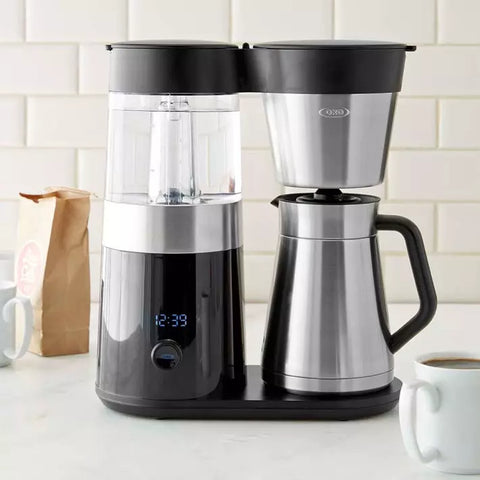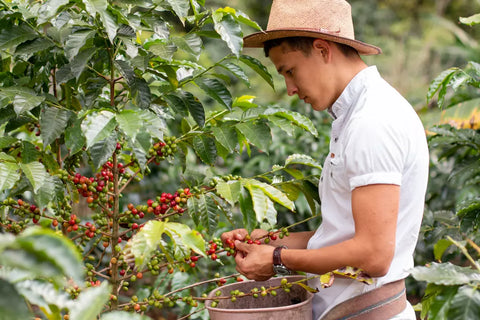The world of coffee has evolved far beyond the days of just light and dark roasts. With the rise of direct trade and fair trade practices, coffee selection has become an exciting journey of ethical and sustainable choices.
Let’s explore the essence of direct trade coffee and the comfort of regular coffee, chat about the striking differences between direct trade and fair trade, compare fair trade coffee to your everyday cup, and guide you towards choosing the coffee that's an exquisite match for your taste.

What Is Direct Trade Coffee?
Direct trade coffee it’s an experience that's beyond sipping; it's a narrative. It is a concept that goes beyond traditional coffee trading practices. Unlike the traditional supply chain, where coffee beans go through multiple intermediaries before reaching consumers, direct trade involves a direct connection between coffee producers and buyers. This connection fosters transparency, fair pricing, and sustainable practices.
Direct trade emphasizes building relationships with coffee farmers and paying them a premium price for their high-quality beans. This approach ensures that farmers receive a larger share of the profits and encourages them to produce exceptional coffee.
What Is a Regular Coffee?
Regular coffee typically refers to conventionally sourced coffee beans that follow the traditional supply chain. These beans are usually sourced through brokers or exporters and pass through several middlemen before they are roasted and packaged for consumers. The term "regular" here does not necessarily indicate lower quality, but rather signifies a coffee that is obtained through the standard channels of trading.
Direct Trade vs. Fair Trade

Characteristics of Direct Trade:
1) Personal Relationships: Direct Trade emphasizes direct connections between coffee producers and buyers, often involving face-to-face interactions and ongoing communication.
2) Transparency: Direct Trade encourages transparency in the supply chain, with detailed information about the coffee's origin, farming practices, and pricing.
3) Quality Focus: Direct Trade emphasizes high-quality coffee production, as buyers often work closely with producers to ensure specific quality standards are met.
4) Higher Prices: Producers in Direct Trade relationships often receive higher prices for their coffee compared to conventional channels, acknowledging the superior quality and fostering sustainability.
5) Community Impact: Direct Trade can positively impact local communities by enabling producers to reinvest in their farms and communities, leading to economic development.
Benefits of Direct Trade:
- Quality Assurance: Coffee under Direct Trade is often of superior quality due to the close collaboration between producers and buyers, resulting in meticulous cultivation and processing.
- Sustainability: Direct Trade encourages sustainable farming practices, as buyers support environmentally friendly methods that benefit both the coffee ecosystem and local communities.
- Empowerment: Coffee producers gain greater control over their businesses and destinies through direct relationships, allowing for more autonomy and decision-making power.
- Fair Compensation: Direct Trade ensures fair compensation for producers, reflecting the true value of their coffee and providing them with a more stable income.
- Cultural Exchange: Direct Trade fosters cultural exchange and learning, as buyers and producers exchange knowledge and experiences to improve coffee quality and production methods.
Characteristics of Fair Trade:

1) Certification: Fair Trade involves certification through organizations like Fair Trade International, which sets standards for labor conditions, environmental practices, and pricing.
2) Minimum Price: Fair Trade guarantees a minimum price to coffee producers, which serves as a safety net during market fluctuations, ensuring a predictable income.
3) Social Focus: Fair Trade emphasizes social justice and aims to improve the livelihoods of marginalized producers by promoting better working conditions and community development.
4) Cooperatives: Fair Trade often involves cooperatives, enabling small-scale farmers to collectively negotiate prices and access resources.
5) Transparency: Fair Trade certification includes traceability requirements to ensure transparency in the supply chain.
Benefits of Fair Trade:
- Poverty Alleviation: Fair Trade contributes to poverty reduction by providing stable incomes and better working conditions to coffee producers in developing regions.
- Community Development: Fair Trade projects fund community development initiatives, such as building schools, healthcare facilities, and clean water sources.
- Gender Equity: Fair Trade initiatives often prioritize gender equity, promoting opportunities and empowerment for women within the coffee industry.
- Environmental Stewardship: Fair Trade encourages environmentally responsible practices, promoting sustainable farming methods that minimize negative ecological impact.
- Consumer Awareness: Fair Trade certification helps raise consumer awareness about ethical consumption and encourages support for products that adhere to fair labor and environmental standards.
Fair Trade Coffee vs. Regular Coffee
Unlike fair trade, regular coffee does not adhere to specific certification standards or guarantee minimum prices to coffee producers. Market fluctuations, diverse production practices, and limited transparency are common features of the regular coffee industry. While some producers within the regular market may prioritize sustainability, the lack of a standardized framework means that consumers must rely on individual producer practices.
Characteristics of Regular Coffee
1) Market-Driven Practices: Regular coffee production adheres to traditional market dynamics, often lacking specific ethical or sustainability considerations.
2) Price Volatility: Coffee prices in the regular market can be subject to significant fluctuations due to market forces, potentially leading to uncertain and unstable incomes for coffee producers.
3) Diverse Practices: The practices employed in regular coffee production vary widely, ranging from conventional methods to those that prioritize sustainable and environmentally friendly approaches.
4) Transparency Challenges: The absence of standardized certification for regular coffee can lead to less transparent supply chains, making it challenging for consumers to gain insights into the source and production practices of their coffee.
5) Market Dependency: Regular coffee farming lacks the minimum price guarantees provided by Fair Trade, making it more susceptible to market price crashes and potentially impacting the livelihoods of producers.
How to Choose the Best One for You
Choosing between direct trade, fair trade, and regular coffee depends on your values, preferences, and priorities. If you prioritize supporting individual farmers and promoting transparency, direct trade might be the ideal choice for you. If your focus is on broader social issues and community development, fair trade coffee aligns with your goals. Regular coffee remains an option for those who seek convenience and are less concerned with direct sourcing practices.
When making your choice, consider the flavor profiles that resonate with your palate. Direct trade and fair trade coffees often emphasize the unique characteristics of specific regions and farms, resulting in distinct flavor profiles that can cater to different taste preferences.
At Pax & Beneficia, we are proud to offer a diverse selection of ethically produced coffees that cater to a range of tastes. Whether you're an advocate for direct trade, fair trade, or prefer the convenience of regular coffee, we have options to suit your preferences. Join our monthly coffee subscription to embark on a flavorful journey that supports sustainable and responsible coffee sourcing, or visit us today and explore the world of coffee like never before.



